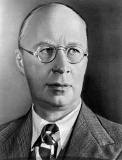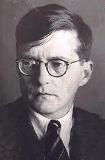
concert:nova, dancers, actors in searing theater piece

|

Sergei Prokofiev
|

Dmitri Shostakovich
|
From “Sarcasms” to DSCH, the chamber ensemble concert:nova illuminated a painful period in history Tuesday night at the Know Theater.
It was the Soviet era, seen through the eyes – and music --- of two of Russia’s greatest composers, Sergei Prokofiev and Dmitri Shostakovich.
The multi-media production, “Pieces in the Key of Silence,” marked a new collaboration between c:n and Michael Burnham, professor of drama at the University of Cincinnati College-Conservatory of Music. Burnham has worked with c:n on programs focusing on composers Arnold Schoenberg and Gustav Mahler. Assisted by CCM professor Steven Cahn, Burnham assembled the text from journalistic and biographical materials, as well as poetry by Yevgeny Yevtushenko, Ossip Mandelstam, Anna Ahmatova, Sasha Cherny and others.
Performing the roles of Prokofiev and Shostakovich, respectively, were dancer/choreographers Stephen Jacobsen and Jimmy Cunningham. Both are members of the corps de ballet for Cincinnati Ballet and participated with c:n in the new Constella Festival of Music and Fine Arts in October. (Interestingly, Cunningham was Prokofiev on that occasion in the world premiere choreography of Prokofiev’s Quintet, Op. 39.)
The Know stage area was bare save for chairs, music stands and a piano. A drape lit with color (blue) provided the backdrop. A trio of Soviet apparatchiks -- actors Will Kiley, Ellie Jameson and Callie Schuttera, who also narrated and spoke the composers’ lines -- introduced Prokofiev. Kiley (in the words of Aaron Copland): “Prokofiev? He was friendly, but not an easy guy to talk to. He was boyish, easily bored, even impolite at times. He was very bright and outspoken.” Pianist Albert Mühlböck began the musical program with excerpts from Prokofiev’s “Sarcasms,” Op. 17 (1912-14), and “Visions Fugitives,” Op. 22 (1915-17).
Dating from Prokofiev’s early to mid-twenties, both works reflect the brash, bold young composer, who, flushed with success, could say (Jameson): “I care nothing for politics. I am a composer. Any government that lets me write my music in peace, publishes everything I compose . . . and performs every note that comes from my pen is all right with me.” Beginning with “Tempestoso” from “Sarcasms,” a percussive, polytonal movement, Mühlböck evoked the rebel not yet brought down by the system. As Prokofiev, Jacobsen danced with confidence, exertion and considerable flair (both dancers choreographed their parts).
The apparatchiks provided a recurring commentary on all that took place during the evening: “All in the name of progress. All just to make things better.”
It was Shostakovich’s turn next. Cunningham looked the part, up to the round, wire-rimmed glasses he wore, maintaining the tip-lipped seriousness associated with the composer and dancing with lightness and agility. The c:n quartet, violinists Anna Reider and Heidi Yenney, violist Joanne Wojtowicz and cellist Ted Nelson, performed the first movement (Moderato) of Shostakovich’s String Quartet No. 1, Op. 49 (1938), a conservative work in the Russian tradition, without the modernity exhibited by most of his earlier music.
Mühlböck closed the first half powerfully with the second and third movements of Prokofiev’s Piano Sonata No. 8. (1944). The scenario was now conflict, with the three apparatchiks surrounding Jacobsen, who pushed them away with a sneer on his face. Apparatchik (Kiley): “You are a brave man, they tell me.” Prokofiev (Schuttera): “I tried to say what I thought loud enough to be heard.” All: “A time will come to have done with those strange times when a man who was simply honest was called brave.”
The famous denunciation of Shostakovich’s “Lady Macbeth of the Mtsensk District” followed intermission. In 1936, Pravda published a scathing review of the opera that put the composer on notice that his life could be in danger. (“This is a game of unintelligibility than can end in tears,” read the review.) Then, isolating Shostakovich further, his friend Ivan Sollertinsky died. To set the scene, Mühlböck, Reider and Nelson performed the Largo from Shostakovich’s Piano Trio No. 2 in E Minor (1944). To make it even more poignant, Cunningham danced with Sollertinsky’s corpse (Jacobsen).
The stage lighting blazed red to illustrate the next blow for the composers, the 1948 decree by the Central Committee of the Communist Party, censuring them for “anti-revolutionary, anti-people formalism.” Prokofiev showed his coolness by talking during Andrei Zhdanov’s speech. Shostakovich wrote a letter of contrition, later telling his friends (Kiley): “I read like a wretch, a parasite, a puppet, a cut-out paper doll hanging on a string.”
Then it was March 5, 1953, the day both Prokofiev and Stalin died (all attention was paid to Stalin). As a kind of latter-day tribute, Nelson and Mühlböck performed the melodic, cheerful Andante grave from the composer’s Cello Sonata in C Major, Op. 119 (1948). Jacobsen danced affectingly here, with some awe-inspiring spins and jumps, then was carried off in death by the three apparatchiks.
In 1960, Shostakovich was forced to join the Communist Party. The evening’s real threnody took place here, with the string quartet performing his Quartet No. 8 in C Minor, Op. 110 (1960). The work is pervaded by Shostakovich’s motto figure, DSCH (D, E-flat, C, B in German transliteration). According to his friend Lev Lebedinsky (Schuttera), Shostakovich intended it to be his final work and to kill himself after completing it.
Led with intensity by Reider, the quartet’s playing was touching, gripping and deeply felt, all reflected in Cunningham’s sensitive choreography. Both in struggling with the apparatchiks and solo, he seemed to be dancing himself to death. At one point, he made dramatic grasping motions, reaching out for something, then pulling it to his chest. The lights
turned purple as the hammer blows of the fourth movement (Largo) began. During the poignant cello solo heard here (Nelson), he danced briefly with Schuttera (Shostakovich’s daughter?). As the Quartet came to its heartbreaking end, he took off his glasses and curled up on the floor in front of the musicians.
The apparatchiks had the last (rueful) word: “Let’s drink to this – that things don’t get any better.”
The next concert by concert:nova is “Shut Up and Play the Zappa,” an introduction to Frank Zappa the classical composer, January 22 at 8 p.m. at the 20th Century Theater in Oakley. Information at www.concertnova.com